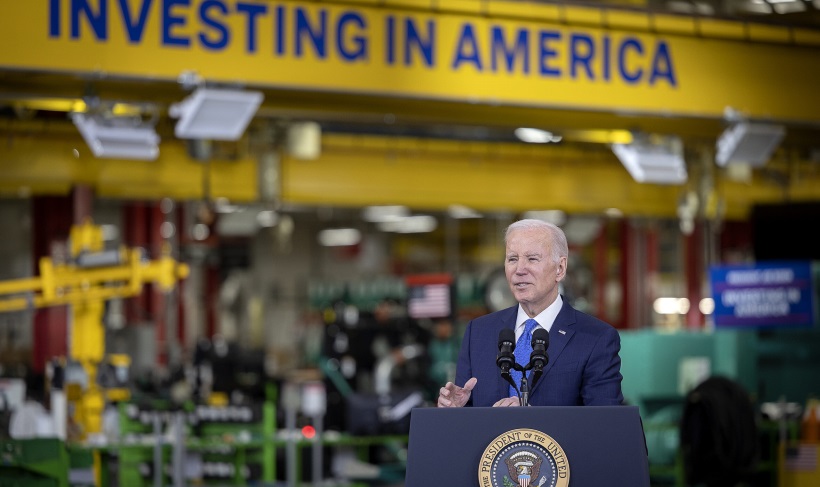The US Department of Energy (DOE) announced 750 million dollars for 52 projects across 24 states to dramatically reduce the cost of clean hydrogen and reinforce America’s global leadership.
These projects—funded by the President’s Bipartisan Infrastructure Law—will help advance electrolysis technologies and improve manufacturing and recycling capabilities for clean hydrogen systems and components, directly supporting more than 1,500 new jobs.
The announcement reinforces the Biden-Harris Administration’s whole-of-government approach to accelerating the deployment of clean hydrogen—as laid out in the US National Clean Hydrogen Strategy and Roadmap and coordinated by the Hydrogen Interagency Task Force.
The projects are expected to enable US manufacturing capacity to produce 14 gigawatts of fuel cells per year, enough to power 15 percent of medium- and heavy-duty trucks sold each year, and ten gigawatts of electrolyzers per year, enough to produce an additional 1.3 million tons of clean hydrogen per year.
Advancing zero or near-zero emissions clean hydrogen is a key component of President Biden’s plan to tackle the climate crisis, create good-paying jobs across the nation, and strengthen America’s manufacturing and industrial competitiveness.
“The Biden-Harris Administration is propelling an American-led clean hydrogen economy that is delivering good-paying, high-quality jobs and accelerating a manufacturing renaissance in communities across America,” states Jennifer M. Granholm, Secretary of Energy.
“The projects announced will supercharge our progress and ensure our leadership in clean hydrogen will be felt across the nation for generations to come,” she adds.
“Connecticut is a global leader in the clean energy and hydrogen sectors, and smart investments will help ensure that it remains one,” indicates US Representative Rosa DeLauro, Ranking Member of the House Appropriations Committee.
“I am proud to have helped pass the Infrastructure Investment and Jobs Act which is providing this funding. These funds will support and create good-paying jobs in a greener economy while combatting the climate crisis and reducing emissions,” she adds.
“This investment will create hundreds of good-paying jobs, bring millions of dollars to our local economy, and keep Michigan at the forefront of clean energy innovation and technology,” says U.S. Representative Debbie Dingell.
“I’m proud to have Nel Hydrogen here in Plymouth Township and will continue to work to make sure Michigan leads the way in the fight against climate change and work to achieve a net-zero economy.”
Together with the Regional Clean Hydrogen Hubs (H2Hubs), tax incentives in the President’s historic Inflation Reduction Act, and ongoing research, development, and demonstration in the DOE Hydrogen Program, these investments will help DOE achieve its ambitious Hydrogen Shot goal of reducing the cost of producing clean hydrogen to one dollar per kilogram.
Unlocking the full potential of clean hydrogen
Clean hydrogen is set to play a vital role in reducing emissions from the most energy-intensive and polluting sectors.
These sectors include key economic engines that are essential to the modern American economy and quality of life, such as heavy-duty transportation and industrial and chemical processes like steelmaking and fertilizer production.
Clean hydrogen can also support the expansion of clean electricity by providing a means for long-duration energy storage and offering flexibility and multiple revenue streams for all types of clean power generation—including renewables, advanced nuclear, and other innovative technologies.
By enabling the development of diverse, domestic clean energy pathways across multiple sectors of the economy, hydrogen development will strengthen American energy independence and accelerate the American manufacturing boom that has already created over 800,000 manufacturing jobs since President Biden took office.
Managed by DOE’s Hydrogen and Fuel Cell Technologies Office (HFTO), these projects represent the first phase of implementation of two provisions of the Bipartisan Infrastructure Law, which authorizes one billion dollars for research, development, demonstration, and deployment (RDD&D) activities to reduce the cost of clean hydrogen produced via electrolysis and 500 million dollars for research, development, and demonstration (RD&D) of improved processes and technologies for manufacturing and recycling clean hydrogen systems and materials.
Selected projects will advance clean hydrogen technologies in the following areas:
- Low-Cost, High-Throughput Electrolyzer Manufacturing (eight projects, 316 million dollars): Selected projects will conduct RD&D to enable greater economies of scale through manufacturing innovations, including automated manufacturing processes; design for processability and scale-up; quality control methods to maintain electrolyzer performance and durability; reduced critical mineral loadings; and design for end-of-life recovery and recyclability.
- Electrolyzer Component and Supply Chain Development (ten projects, 81 million dollars): Selected projects will support the U.S. supply chain manufacturing and development needs of key electrolyzer components, including catalysts, membranes, and porous transport layers.
- Advanced Technology and Component Development (18 projects, 72 million dollars): Selected projects will demonstrate novel materials, components, and designs for electrolyzers that meet performance, lifetime, and cost metrics—to enable cost reductions and mitigate supply chain risks. Longer-term cost reductions enabled by these cutting-edge projects are likely to play a significant role in achieving DOE’s Hydrogen Shot goal.
- Advanced Manufacturing of Fuel Cell Assemblies and Stacks (five projects, 150 million dollars): Selected projects will support high-throughput manufacturing of low-cost fuel cells in the United States by conducting RD&D that will enable diverse fuel cell manufacturer and supplier teams to flexibly address their greatest scale-up challenges and achieve economies of scale.
- Fuel Cell Supply Chain Development (ten projects, 82 million dollars): Selected projects will conduct R&D to address critical deficiencies in the domestic supply chain for fuel cell materials and components and develop advanced technologies that reduce or eliminate the need for per- and polyfluoroalkyl substances (PFAS), often referred to as “forever chemicals.”
- Recovery and Recycling Consortium (one project, 50 million dollars): This funding establishes a consortium of industry, academia, and national labs to develop innovative and practical approaches to enable the recovery, recycling, and reuse of clean hydrogen materials and components. It will establish a blueprint across the industry for recycling, securing long-term supply chain security and environmental sustainability.
Building an American-led clean hydrogen industry
These investments—which amount to 1.6 billion dollars in total (including recipient cost-sharing)—will directly produce more than 1,500 new jobs, along with thousands of additional jobs indirectly generated through resulting economic activity.
By supporting the expansion of domestic fuel cell manufacturing capacity to 14 gigawatts per year, these projects will help enable production of enough fuel cells to power 50,000 medium- and heavy-duty trucks annually—nearly 15 percent of yearly sales.
Similarly, by supporting domestic electrolyzer manufacturing, these projects are expected to enable production of up to ten gigawatts of electrolyzers per year, which is equivalent to adding 1.3 million metric tons to our annual clean hydrogen production capacity.
That’s enough growth in production—in just one year—to provide an annual supply of clean emissions-free fuel for nearly 170,000 long haul trucks.
Furthermore, by driving cost reductions for electrolyzers and fuel cells, these projects will improve the business case for the use of clean hydrogen in heavy duty transportation, industrial applications, and as an energy storage medium, where it can help mitigate the impact of fluctuations in supply and demand and reduce strain on the electrical grid.
The projects announced will also support the long-term viability of DOE’s Regional Clean Hydrogen Hubs and other emerging commercial-scale deployments, by helping to solve the underlying technical barriers to cost reduction that can’t be overcome by scale alone.
The Biden-Harris Administration is committed to ensuring the benefits of the clean energy transition flow to disadvantaged communities.
As part of President Biden’s Justice40 Initiative, the projects announced are anticipated to support workforce development, energy equity, and diversity, equity, inclusion, and accessibility initiatives in disadvantaged communities.
More than 35 million dollars in funding will help project teams develop and implement strong Community Benefits Plans, including:
- Support for nine vocational certificate programs to support automation and manufacturing training.
- Partnering with nine minority serving institutions as subrecipients on RD&D and analysis work.
- Engagement with more than 40 community partners to facilitate community-focused activities such as community advisory boards, improvements to local transportation, and local impact analyses.
In addition, by reducing costs and helping to accelerate the adoption of clean hydrogen, these projects aim to ultimately reduce harmful emissions, which will be especially beneficial for disadvantaged communities disproportionately overburdened by pollution.
Selection for award negotiations is not a commitment by DOE to issue an award or provide funding.
efore funding is issued, DOE and the applicants will undergo a negotiation process, and DOE may cancel negotiations and rescind the selection for any reason during that time.





